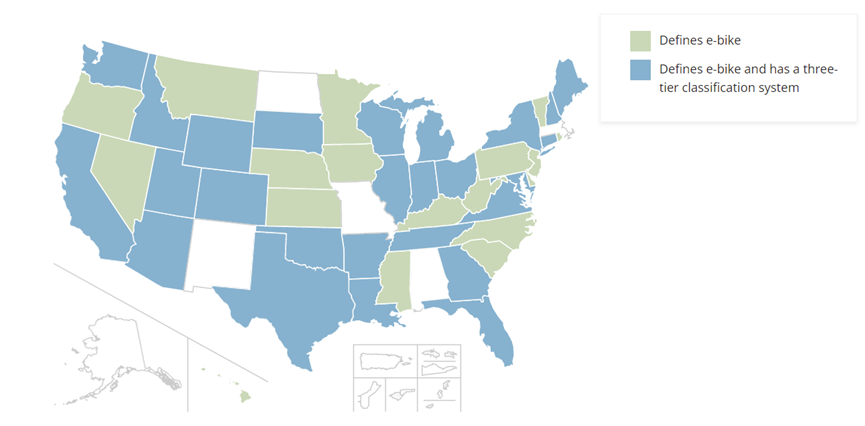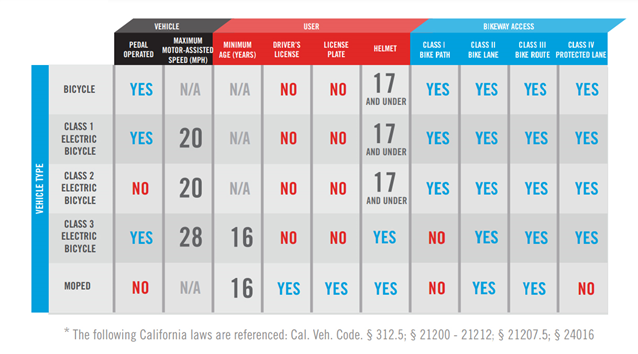 Frey Bike
Frey BikeIn the past decade, the number of e-bikes in the United States has increased, and correspondingly, the laws surrounding e-bikes have also gained attention.
As a brand that focuses on electric bikes, Frey offers many high-power models suitable for off-road and mountain biking. We also pay attention to the development of e-bike laws, especially in the United States, where there is a considerable customer base.
The federal government defines e-bikes in legislation as "throttle-assisted" e-bikes, which are solely powered by an electric motor, and "pedal-assisted" e-bikes, which are powered by a combination of electric motor and pedaling. State traffic laws and vehicle regulations, on the other hand, remain within the purview of state legislatures, and some states have cumbersome licensing, registration, or helmet requirements for e-bikes. The current general trend is to create a three-tiered classification system for an e-bike.

(image credit: ncsl.org)
- What is a three-tiered classification system?
Everyone who has an interest in e-bikes in the US may encounter the three-tiered classification system for eBikes. Simply put, it is a reference to the speed, pedal assistance, and throttle assistance of electric bicycles and has the following three levels:
Class 1: eBikes that are pedal-assist only, with no throttle, and have a maximum assisted speed of 20 mph.
Class 2: eBikes that also have a maximum speed of 20 mph, but are throttle-assisted.
Class 3: eBikes that are pedal-assist only, with no throttle, and a maximum assisted speed of 28 mph.
All classes limit the motor's power to 1 horsepower (750W).
As of 2022, 36 states in the United States have a three-tiered classification system for e-bikes (Alabama, Arizona, Arkansas, California, Colorado, Connecticut, Florida, Georgia, Idaho, Illinois, Indiana, Iowa, Louisiana, Maine, Maryland, Michigan, Minnesota, Mississippi, Missouri, Nevada, New Hampshire, New Jersey, New York, North Dakota, Ohio, Oklahoma, South Dakota, Tennessee, Texas, Utah, Vermont, Virginia, Washington, West Virginia, Wisconsin, and Wyoming), but specific laws in these states have different regulations regarding power, helmets, the minimum age for riding, and license requirements.
Currently, Alaska, Delaware, Hawaii, Kansas, Kentucky, Massachusetts, Montana, Nebraska, New Mexico, North Carolina, Oregon, Pennsylvania, Rhode Island, South Carolina, and Washington D.C. have not implemented a three-tiered classification system for e-bikes, but they have other regulations for bicycles or e-bikes. For example, in Hawaii, e-bikes are defined as "low-speed electric bicycles", and the law requires e-bike owners to be at least 18 years and pay a fee of $30 to register. And helmets must be worn during the ride for anyone under the age of 16.
Therefore, referring to👉 Wikipedia's description of e-bike laws or the latest state legislative documents may be the best way to identify regulations in specific states. 👉The website "People for Bikes" also provides an updated list of state e-bike laws for reference.
- Is there an age limit and driver's license requirement for riding an e-bike?
For class 1 e-bikes, state laws usually do not have too many regulations. However, for level 2 and 3 e-bikes, the law will specify the minimum age for riding, which is mostly 14 years old or older. For example, Virginia currently requires riders to be at least 14 years old to ride without adults, while California requires riders to be at least 16 years old to ride a class 3 e-bike.
Most states do not require registration for e-bikes, but some states require eBikes to be registered and pay relevant fees. As of 2022, the states that have mandatory registration requirements for e-bikes are Alabama, Alaska, Hawaii, Louisiana, Massachusetts, New Mexico, North Dakota, Wisconsin, and Tennessee.
When e-bikes are classified as motorcycles, or when the motor power and speed exceed certain limits (as regulated by the Department of Transportation (DOT) and the National Highway Traffic Safety Administration (NHTSA) as motor vehicles), a driver's license is usually required to ride on the road. States that classify e-bikes into three classes have different requirements.
Therefore, it is important to check with local and state laws to determine if a license is required to ride an e-bike in a specific area.

- Do I have to wear a helmet to ride an electric bike?
States that classify e-bikes into 3 classes generally require class 3 riders to wear helmets. Currently, only Alabama and Massachusetts require all riders of all ages and all classes to wear helmets. Other states have different requirements based on classes and ages. For example, California requires all class 1 & 2 riders under 18 to wear helmets, as well as all class 3 riders of all ages to wear helmets.
Regardless of whether or not your state has helmet laws for e-bikes, it is still recommended for everyone who rides a bike (with or without electric assist) to wear a helmet for safety.
For specific helmet laws in each state, you can refer to 👉helmets.org/ebikelaws
- Insurance issues and incentive programs.
While few laws require insurance for e-bikes before they can be ridden on the road, we still recommend purchasing specialized insurance to protect against potential property damage or injury.
Some states also encourage the purchase and use of e-bikes, whether to improve the environment or address traffic congestion, those incentive programs for e-bikes give us hope for the future of electric bikes. For example, California's statewide e-bike incentive program will launch in the second quarter of this year, offering vouchers for purchasing e-bikes to those who meet eligibility requirements, aimed at reducing air pollution and greenhouse gas emissions.
You can check out global e-bike incentive programs here 👉 climateaction.center/e-bike-programs
- The e-bike laws in California?
Here we take California as an example, to explain the e-bike laws in this state in detail.
In this bike-friendly state, e-bikes are classified into three classes, and there is no requirement for registration, driver's license, or insurance.
👉 The specific regulations are as follows:

(image credit: peopleforbikes.org)
Ready to hit the road?
After reading the e-bike laws in your states, do you find anything special for your riding?
We've heard a lot of customers considering the regulations in their countries. It's truly important to do some research and do a good job in safety measures before hitting the road.
Frey bikes are mainly suitable for mountain bike riding and off-road riding, but you can also prepare them for your commute. In addition, we provide maximum flexibility for your riding, while some bikes can be customized on your terms.
Now that your preparation is done, let's hit the road without worries at all!
👇UPGRADE YOUR RIDE IN EARLY SPRING (06 MARCH – 31 MARCH)
Again, We sincerely hope you can Free Ride & Enjoy Yourself!

